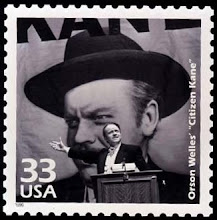Happy Birthday to Albert Einstein, who was born on this date 136 years ago. So why not discuss the
action film where his postage stamps played a critical part of the story? For I’ll be honest: I’m a sucker for time
travel movies, so I have a weak spot for John Woo’s Paycheck (2003), flaws
notwithstanding.
Now Paycheck is not a typical time travel movie because
nobody actually travels through time. Ben Affleck is an engineer-for-hire who builds a machine for
billionaire Aaron Eckhart that can see into the future and right before
getting his memory of the job erased (a scifi conceit that’s part of his
employment contract), he leaves himself an envelope full of innocuous
items—each of which his “future self” knows will (by virtue of using the machine) help him, since he can see that Eckhart plans to betray him. From there, he is forced to go on the lam from
both the law and a team contracted to kill him as he tries to unravel a past he doesn't remember.
What first arouses his suspicion is that despite expecting a
nine-digit payday for his years of service, he discovers that he had mysteriously
declined his salary (one of many things he can't recall after this amnesia
procedure) and this envelope of random junk he left for himself is the only thing he’s left
with. He first receives the envelope
(with cancelled postage) from the registrar at the company:
Registrar: Your personal items. You only needed four stamps.Ben: Oh, well, I guess I can afford the extra 50 cents.
This is before he learns from her that he gave up the
paycheck he had earned, something he can hardly believe he would’ve done
voluntarily. But very quickly, he
realizes (after a narrow escape using a couple of the items in the envelope)
that giving up his salary was his way of telling himself that these items held
enormous value while still getting that message past his employer who would’ve
checked the envelope for anything unusual.
The rest of the movie is essentially one big chase film
after that, so we see this envelope with the Einstein stamps over and over
again, surviving shootouts and high-speed pursuits, since the contents of the
envelope remain his only clues as to why he has been put in such peril. Certainly, no philatelic items in film history are exposed to as much high-octane action as this set.
Eventually, he learns that he had a girlfriend (Uma Thurman)
during his time at the company and despite not remembering anything about their
relationship, he recruits her to his cause--she does remember him, after all--and she gets in on the action, too
(although his assignment was top secret, so she doesn’t know exactly what he was working
on either).
By this time in his career, Woo was on the verge of self-parody. Face/Off (1997) was an irresistible acting tour de
force as John Travolta and Nicolas Cage swap faces and personas, but all the incessant
slow motion and flying doves and heavy-handed symbolism were getting to be
predictable, silly stylistic flourishes.
The second Mission: Impossible film was completely undistinguished and
the less said about the WWII Windtalkers the better. So Paycheck is nice because the action is well-executed but isn’t
as overly-orchestrated as we’re used to seeing from him. And because Affleck is always problem-solving
his way out of situations using the envelope’s items, it’s a movie that
highlights the character’s brains over his brawn.
Ultimately, the stamps serve their most important purpose by
explaining his situation. He intuits
that the excess postage itself was a clue and when inspecting the stamps
closely, he sees that’s he embedded in Einstein's eye a set of microscopic pictures,
“screen shots” from what he saw in the future-vision machine.
They are a series of newspaper headlines
from the future showing that rampant abuse of the machine would destroy the economy, aggravate
international tensions, and ultimately lead to global war. Up to this point, he was able to stay one
step ahead of Eckhart because he had put (pre-amnesia) a poison pill in the
programming of the machine, temporarily sabotaging it so it couldn't be used. But now, he knows he has to go back and
destroy the machine for good with his dwindling supply of envelope “assists”.
It’s important to point out that Albert Einstein does indeed
have two different US stamps, an 8 cent and 15 cent issued in 1965 and 1979
respectively (Scott #s 1285 & 1774). The stamp in the movie is
neither of them. So why manufacture a
fake stamp? One guess is that they needed
a high denomination but still specifically wanted to use Einstein. After all, Affleck does have this
conversation with his one other close confidant, Paul Giamatti.
Giamatti: Look, if we know anything, we know that time travel’s not possible. Einstein proved that, right?Affleck: Time travel, yes. But Einstein was very clear that he believed time viewing theoretically could be accomplished.
It’s from this conversation that they speculate how he was
somehow able to anticipate these items being critically useful to him and, by extension, guess what
he had been building in this mystery job assignment. So the Einstein stamps not only see a ton of action, but they act as a thematic
reference, too.
Paycheck isn’t a great film—Ben and Uma have zero chemistry
and there are a few too many explosions by the climax—but I like the puzzle
aspect of decoding the usefulness of each individual item, and the envelope
itself and the persistent inventorying of its contents hearkens back to that other (far better) stamp movie, Charade.
This was the last film Woo made in the states, returning to a very different Hong Kong from when he made the legendary The Killer, Hard Boiled and A Better Tomorrow. Here's hoping one day he makes his way back across the Pacific; it'd be interesting what the intervening years have taught him.












